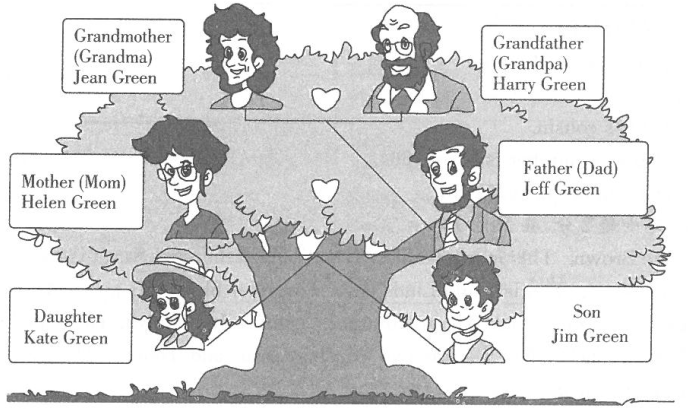七年级(初一)英语试题
I have _____ rules in my home. We have _____ homework to do today.
A . too many; too much
B . too much; too many
C . too many; much too
D . much too; many too
假设你叫Lucy,参加了学校的以“我的校园生活”为题的英语征文比赛。请根据以下要点提示,用英语写一篇短文,60词以上,开头已给出,不计入总词数。
提示:⑴你上下学的时间、交通方式和学校的日常活动。
⑵你和同学们的才艺。
⑶表达你对学校生活的喜爱。
Hi, everyone! My name is Lucy. I'm happy here to talk about my School life.
阅读理解

-
(1) This is Jim's ______tree.A . family B . student C . school D . class
-
(2) Jim's father is _______.A . Harry Green B . Jeff Green C . Helen Green D . Jean Green
-
(3) Kate is Jim's _______.A . brother B . sister C . father D . mother
-
(4) Jim's grandparents are _________.A . Kate Green and Jeff Green B . Harry Green and Helen Green C . Harry Green and Jean Green D . Jeff Green and Helen Green
-
(5) Helen is Jim's _______.A . sister B . classmate C . father D . mother
在展览会上,我爸爸请一些农民教他如何种植蔬菜。
At the fair, my dad asked some farmers him how vegetables.
Look! Some people ____ photos on the beach.
A . took
B . takes
C . are taking
D . is taking
The restaurant often provides (we) with free food.
________ playing football after class?
A . How
B . What
C . How about
D . When
Cindy's father is engineer and he is very busy.
When I ask him for help, he always tries his best ____________________ me.
A . help
B . helping
C . to help
D . helps
The boy is ___________ smart ___________ everybody(人人;每个人)likes him.
A . so, that
B . too; to
C . very, that
Are you a student ________ a teacher?
A . and
B . or
C . of
D . but
—Do you like _______?
—Yes, I like ______very much.
A . apple; them
B . apples; it
C . apples; these
D . apples; them
He doesn't take the train to work(改为同义句)
He doesn't to work .
— Are Michael and Kangkang in the same grade?
— Yes. But ____ are in different classes.
A . them
B . their
C . we
D . they
— Can Joan play volleyball?
— __________. She can plays it well.
A . Yes, she can
B . No, she can't
C . Yes, she does
D . No, she doesn't
Mary has piano
lessons on Sunday. I have piano lessons on Sunday, too. (保持句意基本不变)
Mary has piano lessons on Sunday. I.
Jim is late for school. He is always the first to come to school.
A . often
B . always
C . usually
D . never
假设今天是9月20日,请发挥想象写一篇日记,记述你今天和朋友去爬山的经过。
要求:1. 句子通顺、表达准确;2. 词数不少于60词。
阅读理解
Americans are very direct people.When they want something,they say“yes”.When they don't.they say“no”.If they want something different from what is given,they will ask for it.Here's an example.
I arrive at someone's house and he gives me wine,but I don't want wine.I will say“No,thanks”.If everyone around me is drinking something,I would ask for something else,“No,thanks.But l'd like to take a cup of tea.”If I really want wine,I just say“Yes,thank you”.
Unless they happen to know the Chinese customs, Westerners will not ask you again and again after you have said you don't want it.
Americans are very direct people.When they want something,they say“yes”.When they don't.they say“no”.If they want something different from what is given,they will ask for it.Here's an example.
I arrive at someone's house and he gives me wine,but I don't want wine.I will say“No,thanks”.If everyone around me is drinking something,I would ask for something else,“No,thanks.But l'd like to take a cup of tea.”If I really want wine,I just say“Yes,thank you”.
Unless they happen to know the Chinese customs, Westerners will not ask you again and again after you have said you don't want it.
-
(1) According to the passage. are direct.A . Chinese B . Americans C . Japanese D . Australians
-
(2) If Americans want something.they would say“ ”.A . Yes,thank you B . No,thanks C . No.I'm sorry D . Yes,I don't like it
-
(3) In this passage.the underlined word “Westerners”means .A . the people who live in the west of their country B . the visitors who go to the Western countries C . the people who live in the Western countries D . the people who know the customs of the West
-
(4) The Chinese people might if you don't want something given.A . be glad B . say“thank you'' C . get angry D . ask you again to take it
-
(5) From this passage.we know thatA . the Chinese people are direct B . the Chinese customs are better C . the Westerners are more polite D . different countries have different customs
—Hurry up. The last bus at 11:30 pm.
—Too late. It 10 minutes ago.
A . left; left
B . left; leaves
C . leaves; left
D . will leave; leaves
最近更新
- 下列句子中,加点的成语使用恰当的一句是 ( ) A.植物有自己的变化规律,它总是随
- 下图表示某高等动物精巢内形成精子的过程中,每个细胞核中DNA分子数量的变化,下列各项中对本图解释正确的是A.e时刻DNA
- 下列四幅图片,能体现二战后“冷战”时期美苏关系的是( ) A
- Although some people expressedtheir disagreement at the mee
- 12.科学家研究小麦20 ℃时光合作用强度与光照强度的关系,得到如右图曲线。下列有关叙述错误的是()A.在25 ℃条件下
- 下列各组词语中,有两个错别字的一组是( ) A.羁拌 破天荒 冒然从事 老骥伏历,志在
- ____ Johnny says sounds right to Helen.That’s why she has ma
- 位于消化道外的消化腺有()A、唾液腺、肝脏、胰腺B、肠腺、胰腺、胃腺C、唾液腺、胃腺、肝脏D、肝脏、胰腺、肠腺
- 关节由 、 和 等构成
- 在十月革命后苏维埃政府采取的革命措施中,最能反映当时俄国任命迫切愿望的是( A、由工人对生产和分配进行监督
- 欧洲一体化是经济区域化趋势的典型代表,不断深入发展。以下不是在这一进程中出现的是 A.欧洲煤钢共同体 B.欧洲共同体
- 下列选项描述的过程能实现化学能转化为热能的是
- 设“=1”是“y=”的最小正周期的________条件。
- 标准状况下,在3支相同体积的试管中分别充有体积比为4:1的2种混合的气体,它们是: ①NO和NO2②NO2和O2③NH3
- 如图,是小刚在电脑中设计的一个电子跳蚤,每跳一次包括上升和下降,即由点A—B—C为一个完整的动作。按照图中的规律,如果这
- 在企业分配中,如果过分压低劳动报酬,则不利于调动劳动者的生产积极性,终将限制企业的发展。这说明:A.公平是提高效率的保
- 小明在一次练习中把下列选项连在了一起,其中错误的是 A.中共一大——中国革命的面貌从此焕然一新B.中共二大——党的历史上
- 下列符号,能表示两个氢分子的是A.2HB.2H2C.2H2OD.2H+
- Beijing is a large city you can find many people fro
- 武广高速铁路客运专线是我国重要的高铁专线,图A是武广高铁路线分布图,图B是武广高铁所经省区及新疆、西藏的人口和面积柱状图



